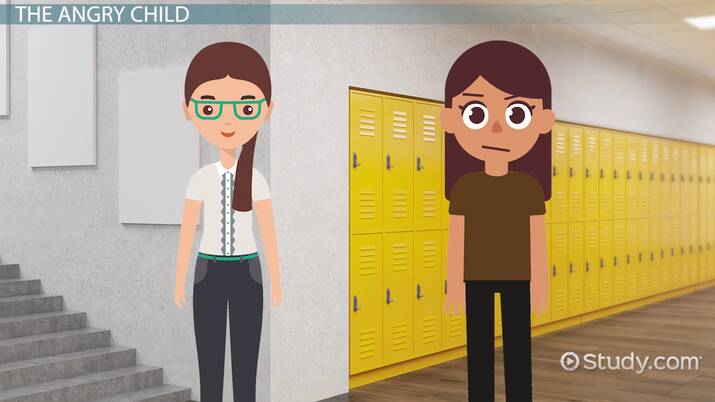Mike Nieradko holds a PhD in Chemistry with over 10 years of teaching and tutoring experience in Math, Chemistry, and other sciences.
Angry Child Syndrome: Psychology & Symptoms
Table of Contents
- The Angry Child
- ODD
- Bipolar Disorder
- Child Antisocial Disorder
- Other Potential Causes
- Lesson Summary
From the time she was about two years old, Emma's mom noticed something was different about her. She seemed to anger easily, lash out at others, and show a lack of empathy. As Emma grew older, she almost seemed to bother and pick on people on purpose. Her anger grew out of control and got her in a lot of trouble during middle school. Now in high school, Emma refuses to ever admit she is wrong. She often blames teachers for being sent out of class, or reported to the principal for discipline. She is very spiteful, and never apologizes. Emma's mom is concerned about what the future may hold for her daughter if she doesn't get a grip on her anger issues.
Angry child syndrome refers to children, like Emma, who become excessively and easily angered to extremes. Uncontrolled anger can lead to significant consequences if it is not properly diagnosed and managed. There are no specific identified causes behind angry child syndrome, however, ruling out any pre-existing medical conditions. Three common underlying related mental disorders include oppositional defiant disorder or ODD, bipolar disorder, and child antisocial disorder. Let's take a look at each of these disorders and the symptoms associated with them.
The onset of oppositional defiant disorder (ODD) typically occurs in early childhood and before the teenage years. The following are symptoms that are usually observed in children who have ODD:
- Angry and temperamental – easily losing one's composure even over little things.
- Refusing to play by the rules – children with ODD will often neglect or break rules that parents and caregivers put into place.
- Difficulty with maintaining and developing relationships – this includes at home, at school, and in social settings.
- Purposefully getting others upset – inciting arguments when there is no reason to argue.
- Irritable and upset
- Refusing to take responsibility for actions – always blaming others for things.
- Self-absorbed – lack of empathy for others.
- Spiteful – a desire to hurt someone else either physically or mentally.
ODD ranges from mild to severe and caregivers suspecting ODD should seek professional help for diagnosis and treatment.
Children with bipolar disorder are tough to diagnose because many of the symptoms of this illness mimic those of attention deficit disorder, a disorder that makes it difficult to concentrate and focus. The following are symptoms that are common in children with bipolar disorder:
- Extreme moods and mood alterations – children tend to go from extremely happy and excited to very angry and hostile or sad and depressed.
- Excessive talking to isolation
- Insomnia to sleeping excessively
- Talking incessantly to withdrawing
- Engaging in risky behavior – drinking alcohol or taking drugs, or engaging in dangerous activities.
Like ODD, bipolar disorder can be treated successfully once diagnosed.
Children who are antisocial typically exhibit the following symptoms:
- Participation in illegal activities
- Hurting others either verbally or physically
- Impulsiveness
- Lying
- Aggressive and angry
- Lack of empathy
- Engaging in reckless behavior
As with other mental disorders, the sooner child antisocial disorder is diagnosed, the sooner it can be treated.
While ODD, bipolar disorder, and child antisocial disorder are often related to angry child syndrome, there are a number of additional potential causes. While by no means exhaustive, some of these include:
- Medical conditions – brain tumors, for example, can trigger the anger response in the brain. It is important that children with anger issues are given a thorough medical examination.
- Medications – certain medications like stimulants can exaggerate anger.
- Other mental health conditions – there are many other mental health conditions that can contribute to excessive anger including ADHD, anxiety, conduct disorder, and psychosis.
- Learning disabilities
- Stress and anxiety
- Neglect and family circumstances
Angry child syndrome is a condition where explosive and uncontrollable anger is present in children. There is no immediate cause for this syndrome, but rather several psychological conditions that have been linked to it. Three of those conditions include:
- Oppositional defiant disorder, which is marked by symptoms ranging from anger to lack of empathy.
- Bipolar disorder characterized by the presence of extreme mood swings. This condition often presents similarly to attention deficit disorder, a disorder that makes it difficult to concentrate and focus.
- Child antisocial disorder, commonly associated with participation in risk-taking activities, anger, and impulsiveness.
In addition to these psychological conditions, other possible causes include medical conditions, types of medications, other mental health issues, stress, neglect, and learning disabilities.
Medical Disclaimer: The information on this site is for your information only and is not a substitute for professional medical advice.
Register to view this lesson
Unlock Your Education
Become a Study.com member and start learning now.
Become a MemberAlready a member? Log In
BackResources created by teachers for teachers
I would definitely recommend Study.com to my colleagues. It’s like a teacher waved a magic wand and did the work for me. I feel like it’s a lifeline.






